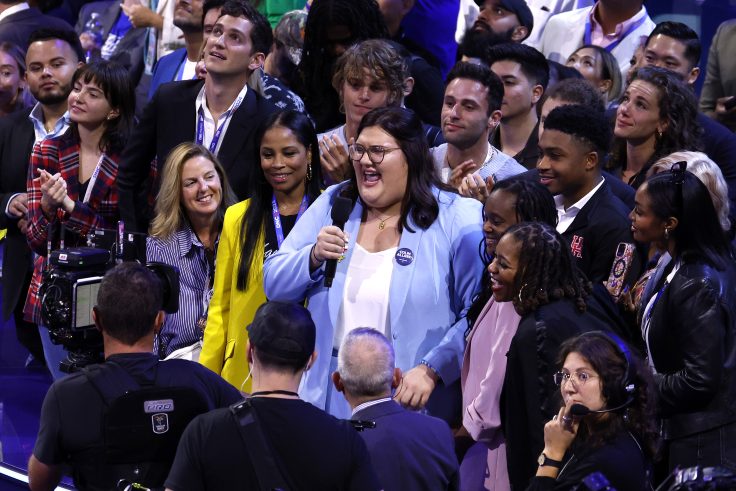Arabella offshoot Sixteen Thirty Fund is paying left-wing influencers thousands of dollars a month to parrot Democratic talking points. They’re not supposed to tell anybody, but they’re complaining to the press.

The first rule of Fight Club is you do not talk about Fight Club. The Sixteen Thirty Fund, an offshoot of the left-wing dark money behemoth Arabella Advisors, tried to enforce that dictum when recruiting an army of handsomely paid left-wing influencers to spout Democratic talking points through an effort called “Chorus.”
Contracts reviewed by Wired stipulated that they weren’t supposed to reveal their affiliation with the Sixteen Thirty Fund or tell anybody they were being paid to mouth Democratic Party shibboleths. Presumably that includes complaining to reporters about the stringent terms of the contract and the astroturf nature of the project to “build new infrastructure to fund independent progressive voices online at scale.” Oops.
According to Wired, some of the online Left’s biggest names—including Olivia Julianna, who spoke at the 2024 Democratic National Convention; the “nonbinary content creator” Adesso Laurenzo, who boasts nearly one million TikTok followers; and Aaron Parnas, a social media journalist described by Rolling Stone as “a sort of 20-something Walter Cronkite”—expressed interest. Then they read Chorus’s proposed contract. It included the following terms, according to Wired:
- Influencers cannot disclose their affiliation with Chorus or the Sixteen Thirty Fund.
- Influencers cannot disclose “the identity of any Funder” or reveal they’re being paid.
- Influencers “must funnel all bookings with lawmakers and political leaders through Chorus,” even those organized independently.
- Influencers cannot use their monthly stipend “to make content that supports or opposes any political candidate or campaign without express authorization from Chorus in advance and in writing.”
- Influencers must attend “regular advocacy trainings,” “daily messaging check-ins,” and biweekly “newsroom” events with lawmakers and other figures.
- Influencers must remove content created at said events if Chorus requests them to do so.
Chorus gave the influencers two days to sign the contract and barred prospective affiliates from enlisting their lawyers to request changes.
On a Zoom call with the influencers, a partner at Democratic fixer Marc Elias’s Elias Law Group, Graham Wilson, boasted that “housing” Chorus through a nonprofit gave them “some real great advantages.”
“It gives us the ability to raise money from donors,” he said, according to Wired. “It also, with this structure, it avoids a lot of the public disclosure or public disclaimers—you know, ‘Paid for by blah blah blah blah’—that you see on political ads. We don’t need to deal with any of that. Your names aren’t showing up on, like, reports filed with the FEC.” (Elias Law Group made national headlines when it threatened to stop work for longtime client Media Matters if it didn’t fork over $2.25 million in unpaid bills.)
Many of the influencers approached to join Chorus expressed concerns over the setup in a group chat. “Nonbinary content creator” Laurenzo floated sending a “joint email” requesting changes, while a “reproductive justice influencer named Pari” said there were “at least 4 other things that should change.”
Ultimately, most of them fell in line. “I don’t feel strongly about pushing tbh,” wrote Parnas, the young Cronkite. “They aren’t going to modify it anymore. Seems like a take it or leave it.”
Many chose to take it, as shown through joint content some Chorus influencers have already started releasing.
In a weekly Instagram series called “Good News in Politics,” Chorus members including Sander Jennings, the brother of transgender activist Jazz Jennings, read headlines that made up the left’s “wins of the week.” They included, “Chappel Roan Will Donate $1 Per Ticket to Trans Youth Charities on Her Mini Fall Tour” and, “‘Finally, Relief Is On Its Way’: NY to End Prison Phone Fees.”
The push to prop up left-wing influencers using dark money comes as liberal operatives fret over a shifting media landscape. Social media creators have gained influence at the expense of the traditional cable and print sources that Democrats have long dominated. President Donald Trump spent much of his 2024 campaign sitting for viral interviews with those creators. Kamala Harris, by contrast, was forced to spike an interview with a Muslim influencer because her performance was deemed too embarrassing.
In the wake of Harris’s loss, Democratic strategists have discussed ways to “find the next Joe Rogan” at swanky donor retreats. It’s clear from Chorus’s contract, however, that the group is not interested in pursuing what is widely considered the most important quality in alternative media: authenticity. Instead, it wants control.
While it’s unclear exactly who is funding Chorus through the Sixteen Thirty Fund, the dark money group has no shortage of deep-pocketed backers. Swiss billionaire Hansjörg Wyss has contributed at least $208 million to the Sixteen Thirty Fund since 2016. George Soros is another top donor—he funneled $24 million to the fund in 2021 alone.
While Wyss and Soros have disclosed their donations, the Sixteen Thirty Fund itself does not reveal its benefactors, meaning many are unknown. Arabella Advisors, a left-wing dark money “mothership” that controls the Sixteen Thirty Fund and other offshoots, raised a staggering $1.35 billion from anonymous donors in 2022. That year, the fund spent nearly $200 million backing pro-choice ballot measures. In 2020, it “doled out a whopping $410 million” to finance “attack ads against Trump and vulnerable Republican senators,” according to Politico.
















